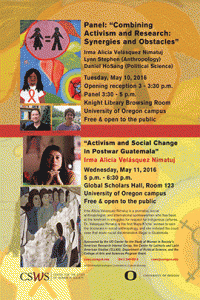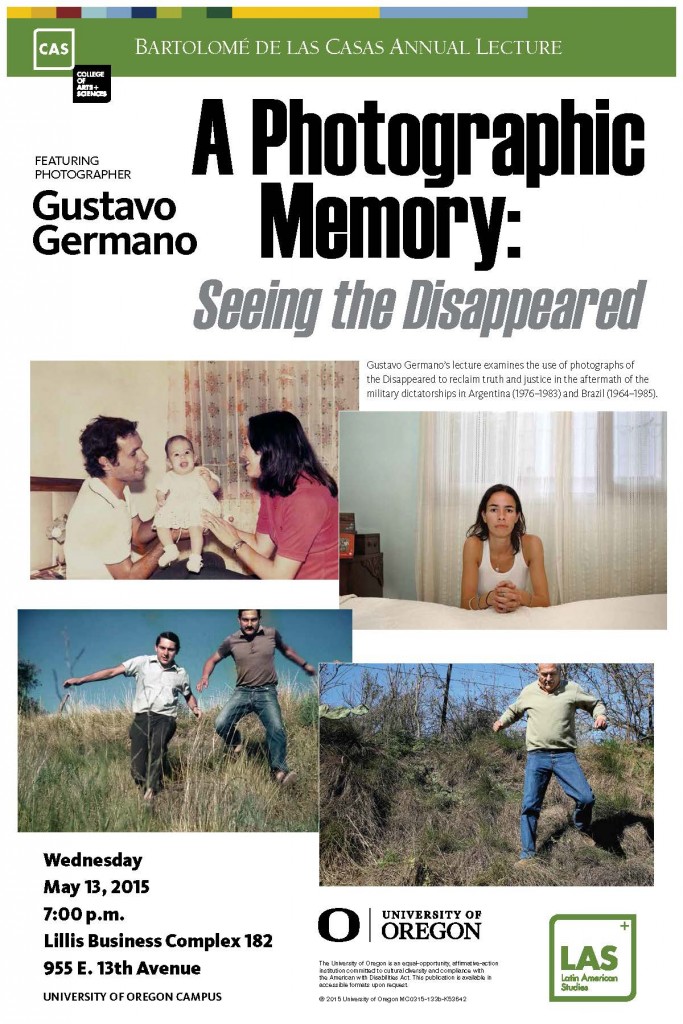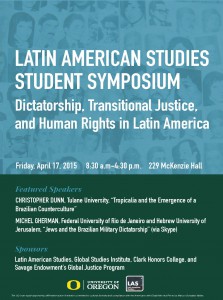Posts under tag: Human rights
“Activism and Social Change in Postwar Guatemala”
Irma Alicia Velásquez Nimatuj
Wednesday, May 11, 2016
5 p.m. – 6:30 p.m.
Global Scholars Hall, Room 123
University of Oregon campus
Free & open to the public
Irma Alicia Velásquez Nimatuj is a journalist, social anthropologist, and international spokeswoman who has been at the forefront in struggles for respect for indigenous cultures. Dr. Velásquez Nimatuj is the first Maya-K’iche’ woman to earn the doctorate in social anthropology, and she initiated the court case that made racial discrimination illegal in Guatemala.
Bartolomé de las Casas Annual Lecture–Gustavo Germano–“A Photographic Memory: Seeing the Disappeared”
Bartolomé de las Casas Annual Lecture
“A Photographic Memory: Seeing the Disappeared”
Wednesday, May 13, 7pm, 182 Lillis
Gustavo Germano will examine the use of photographs of the disappeared to reclaim truth and justice in the aftermath of the military dictatorships in Argentina (1976-1983) and Brazil (1964-1985). He will present the “antecedents” of the use of photography—both by the State organisms of control and the families of those kidnapped and murdered by the regime, who generally used the same photos emitted by the State in their campaign to find their family members. Germano will speak of his project, which seeks to give visibility to the disappeared. The Argentine photographer has personal connections to the issue, as his own brother was one of the disappeared, whose remains were found only last summer.
This lecture is co-sponsored by the Clark Honors College, the Office of Academic Affairs, the Global Studies Institute, the Department of Romance Languages and the Savage Endowment’s Global Justice Program.
**”Ausencias” at the JSMA**
In his work “Ausencias” (Absences), Germano restages snapshots of Brazilian and Argentine families whose loved ones are among the “disappeared”–people who were tortured and murdered by dictatorial regimes in South America from the 1960’s to 1980’s. The two images—the original photo and the recreated photo, with one or more people missing, are displayed together.
The Latin American Studies Program at the University of Oregon brought this work to the Jordan Schnitzer Museum, which embraced the project. The exhibit is currently on view, running from April 14 to August 16. More information about Gustavo Germano can be found at his site, http://www.gustavogermano.com. See also http://www.bbc.com/news/world-latin-america-21295117, http://www.puppiesandflowers.com/?p=4840 and https://jsma.uoregon.edu/Ausencias. The Latin American Studies Program would like to acknowledge the generous support of the “Oregon Humanities Center’s Endowment for Public Outreach in the Arts, Sciences, and Humanities” in securing the rights to present Gustavo Germano’s work at the UO.
LAS Student Symposium: Dictatorship, Transitional Justice, and Human Rights in Latin America
Latin American Studies Student Symposium
Dictatorship, Transitional Justice, and Human Rights in Latin America
LAS Student Symposium: April 17, 2015, McKenzie Hall 229
LAS Student Symposium Schedule
Featured speakers
- Christopher Dunn, Tulane University, “Tropicalia and the Emergence of a Brazilian Counterculture”
- Michel Gherman, Federal University of Rio de Janeiro and Hebrew University of Jerusalem, “Jews and the Brazilian Military Dictatorship”
10.24.13 “From Silence to Memory: Archives and Human Rights in Guatemala and Beyond”
“From Silence to Memory: Archives and Human Rights in Guatemala and Beyond”
University of Oregon, October 24, 2013
In 2005, a massive amount of documentation belonging to the former Guatemalan National Police was discovered. Among other types of data, it contained invaluable information on systematic human rights violations during the 36-year civil war that ravaged that country. The National Police Historical Archive (AHPN) has become a central piece in the efforts to find truth, justice, and reconciliation in Guatemala, and its work is attracting world-wide attention from archivists, librarians, scholars, activists, and human rights organizations.
The University of Oregon is proud to announce the publication of the English translation of the report From Silence to Memory. Revelations of the AHPN, originally published in Spanish in 2011, and to present the premiere of a documentary on the AHPN produced by Gabriela Martínez (UO School of Journalism and Communication), that tells the amazing story of this archive. A stellar line-up of speakers will highlight the importance of the work conducted by the AHPN and will reflect on the connections between the preservation of archives, the construction of collective memories, and the fostering of a culture of human rights in Guatemala and elsewhere.
Program
3:00-4:00 p.m. Knight Library Browsing Room
“‘From Silence to Memory’: Revelations of the Archivo Histórico de la Policía Nacional.”
Chair: Stephanie Wood (University of Oregon)
Panelists:
Jean Franco (Columbia University)
Gustavo Meoño (National Police Historical Archive, Guatemala)
Kent Norsworthy (University of Texas, Austin)
4:00-5:00 p.m., Knight Library Browsing Room
Philip H. Knight Dean of Libraries Distinguished Lecture
“The Role of Archives in Strengthening Democracy and Promoting Human Rights.”
Trudy Peterson, consulting archivist and former Acting Archivist of the United States.
5:00-6:00 p.m., Reception in Knight Library Browsing Room
6:00-7:30 p.m., 221 Allen Hall
Presentation of the documentary Keep Your Eyes On Guatemala by Gabriela Martínez (Associate Professor, School of Journalism and Communication, University of Oregon)
Introductory remarks by Peter Laufer, James Wallace Chair in Journalism
Screening of documentary
Q&A with film director and other guests.
These events are sponsored by the University of Oregon Libraries, the Network Startup Resource Center, the Latin American Studies Program, the School of Journalism and Communication, and the Oregon Humanities Center


